Ploshcha
25- 9.09.2015, 7:37
- 61,963
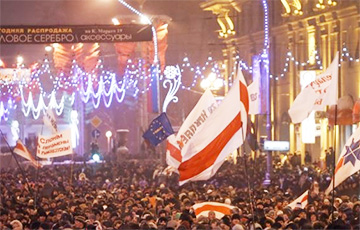
Charter97.org continues to publish extracts from Andrei Sannikov's book Belarusian Amerikanka or Elections under Dictatorship.
The beginning of extracts is available here.
- It was a day packed with events both in my personal life and in the life of my country. It was a day of worried hope ending in bloody disappointment. It was the day of the presidential elections in Belarus.
We decided to go as a whole family to vote. We got up early in order to be at the polls at 9:00 am. We voted at High School No. 18 on Kalinina Street, where I was registered. There were a lot of reporters. Danik seemed a little in shock from the number of people at the polls, but he regarded seriously his mission of public accompaniment of his parents. I went into the booth, filled out a ballot, then we three went to the ballot box to vote and to the flash of cameras, dropped my vote in.
After giving a brief commentary to journalists, we went to another precinct. Irina and I are registered at different locations, therefore we voted at two precincts. Irina voted at High School No. 7 near our house. There were less journalists there. Although there were more tails.
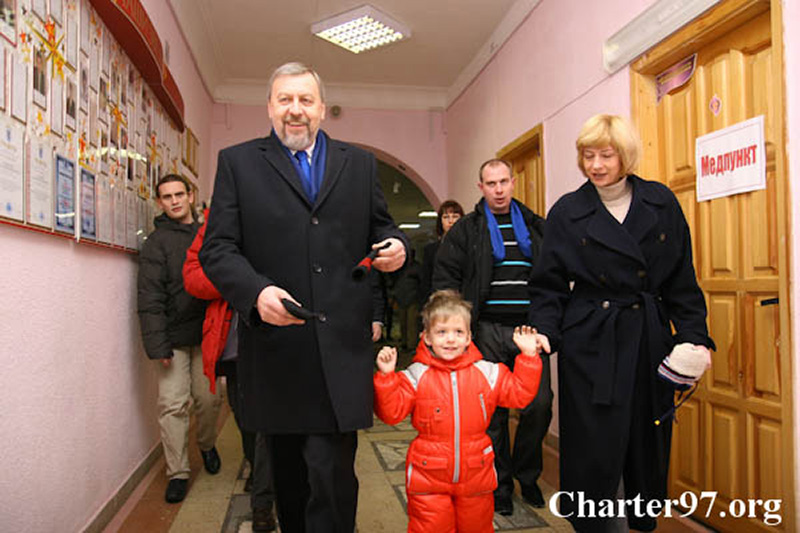
After voting, we went home. Now there was only the wait until evening. Time would speed up, then drag slowly, minute by minute. There was also worry, but more strongly there was hope that the situation in Belarus would start to change today. A lot of efforts had gone into this.
Toward evening, we began to gather to go to the Ploshcha. Natasha Kolyada called us as we were leaving the house, somewhere around 7:30 pm, and reported that Neklyayev had been beaten, that they were taking him to the hospital. It became clear that we might not reach the Ploshcha.
At the advice of Zmitser Bandarenka, we decided to make our way toward Oktyabrskaya Square, or the Ploshcha not from the direction of home, but from the opposite direction, from GUM, the department store. Therefore we drove in the car closer to the avenue from the side of Komsomolskaya Street and came out and joined a rather impressive group of people coming out of the station, where Rymashevsky and Statkevich had scheduled a meeting with their activists. We had told our supporters to go directly to Oktyabrskaya Square, which after the events of 2006, young people named after the Belarusian hero Kastus Kalinowski.
The authorities were expecting that after the intimidation and threats on television, people will not come out on the street. But there were already several thousand people on the Ploshcha. The KGB had prepared everything so that people would be prevented from gathering and organizing a rally. A skating rink had been poured at the center of the Ploshcha on which there were a fair number of skaters – I suspect that these were “plainclothes speed skaters.” Loud music was playing – Russian pop.
People kept coming, but at first there were only megaphones in terms of equipment. It became clear that the authorities from the outset were intending to provoke confusion. Even so, we managed to hold a brief rally on the steps of the Palace of Trade Unions, at the end of which the sound system appeared, which activists from European Belarus brought, who were used to operating with the maximum of conspiracy – and thus effectively.
Almost all the presidential candidates and their staffs gathered. On the Ploshcha, the exit-polls of Ukrainian, Russian and independent Belarusian public opinion services were read out. According to those figures, Lukashenka had gathered less than 40% of the votes and a second round in the presidential elections must take place.
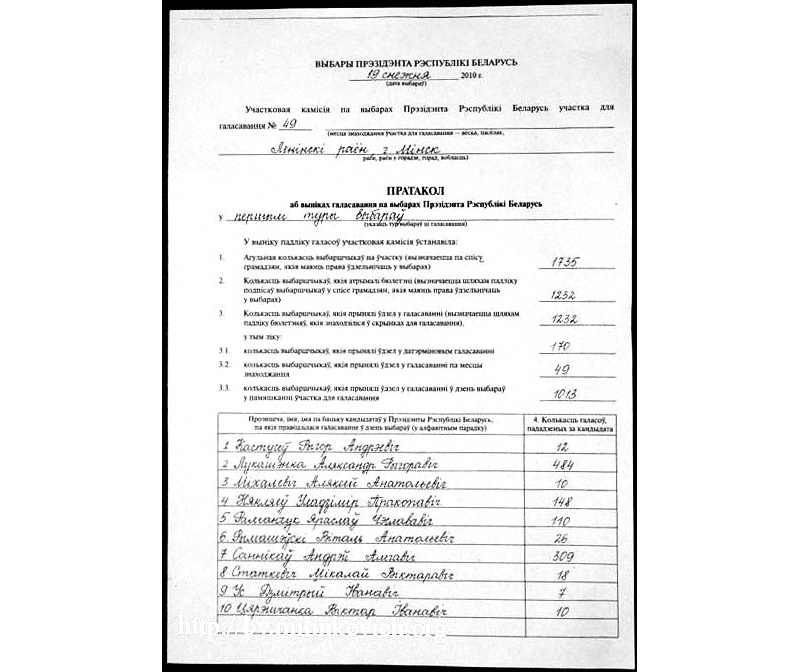
Kalinowski (October Square) began to fill up, and the Russian pop music got louder and louder. Movement began towards Independence Square, where the Central Elections Commission was located. We went out on the traffic part of the avenue and moved toward the center of a mass of people. As we came out of the square, the road was blocked for people by a small chain of traffic police. We approached them and began to talk with them and try to convince them to let people through. The traffic people closed off movement more for form’s sake than in reality. Around the sides of the chain, there was enough space for people to get through. The traffic police bent backwards and we went further. Finally, they parted, and we moved along the main street of Minsk.
This peaceful procession in the center of Minsk was the culmination of that day, December 19, 2010. This procession was a real breath of freedom. Suddenly, the entire central part of the avenue was filled with people. The people who stood along both sides, a bit ahead, observing the unfolding of events, after the start of movement, massively poured into the common procession.
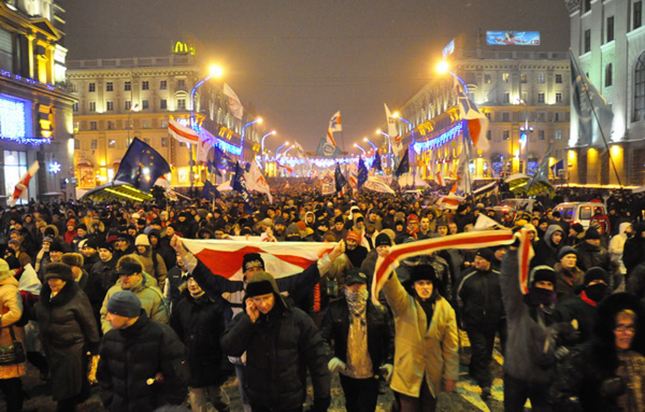
It was an enormous mass of people moving from Ploshcha to Ploshcha, and it seemed that we took a full chest full of this air of freedom which was poured out in the center of my city. “Zhyvye Belarus!” (Long Live Belarus!) could be heard, along with “Get out!” “Verym, mozham, peramozham!” (“We believe, we can, we will overcome!”) and “Re-vo-lu-tion!” which were picked up by thousands of voices.
From people’s energy, the city was fired up with a fantastic light. It seemed as if everything was possible. It seemed that it would be impossible to respond to such a popular surge with force. It seemed that we were close to the moment when in the thick, grey wall of the dictatorship, a crack would appear. No one wanted and of course no one planned to storm anything or seize anything. There was the hope that the impending inevitable crisis would force the government to take a step toward the changes.
Such altruism was, of course, romanticism of the purest sort. It was just hard to imagine that at the moment of people’s uplift in spirits in the center of Minsk, somewhere in a bunker, the dictator and his entourage were shaking with fear and thinking not about how to save the country but about how to preserve their foul power. That this was the case is not in doubt. A frightened Lukashenka gave the order for the break-up of a peaceful demonstration with force. His fear was visible in each of his appearances before the television cameras on the eve of the elections and afterwards, no matter how much he tried to hide it.
We reached Independence Square and took our position there. The press to this day continues to try to find out which of the candidates had plans for the Ploshcha that day. Likely this is natural. I can speak only for myself and my team.
I can say that a certain tradition had already formed in Belarus up to that time. On the first day of the demonstrations and rallies after elections, whether parliamentary or presidential, people were not touched. Not because of the regime’s love of humankind, but because in Minsk, on election day, there was a large number of foreign correspondents and international observers, politicians and parliamentarians. Under the glare of foreign cameras or foreign politicians, the foul and cowardly regime feared showing their true face. It was another matter when the foreigners went home, then the regime could come out waving the police clubs.
I set two tasks for myself: to remain on the Ploshcha to the end, no matter what happened, and to try to stay through the night. The previous presidential candidates, Vladimir Goncharik and Aleksandr Milinkevich, tried to disperse people who had gathered to protest as quickly as possible, and thus deprived us of a chance for victory.
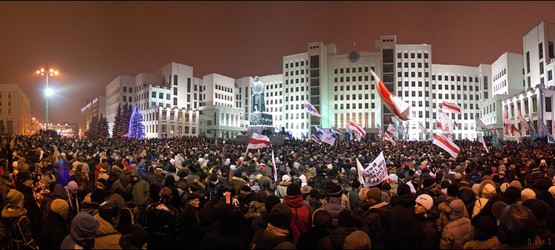
It was important to be able to stay through the night, because the experience of the Ukrainian Maidan of 2004 at which there were many Belarusians illustrated that on the day after elections, the number of protests will grow in geometric progression. On the next day, you can already create a common headquarters. We realized that 50,000 Belarusians coming out on December 19 was only the start of the avalanche. Belarusians are so constructed that they need at least a short time in order to take a look around. Alas, Lukashenka knew that, too, which is why he unleashed on us his entire repressive machine in the first hours after the elections.
The most realistic chance to return the history of Belarus to its natural path was lost: by the opposition, the government, and the people. But this day goes down in history as a day of the struggle of Belarusians for freedom.
Recently I was fortunate to hear the Polish film-maker Andrzej Wajda who described the Warsaw Uprising of 1944. The legendary director showed his documentary film of that event. The second director of the film, Andrzej Kotkowski was also present at the meeting. He described the amazing story of his meeting with a rebel who went through hellish torments. The young Pole was heavily wounded. Through some miracle, he managed to get across to the other shore of the Vistula, where he lost strength and fell into a faint for a long time. He should have died, but several days later he was found in the ruins under the bridge. They took him to a hospital. The young man was mutilated and it took him two years to recover. They cured him, and he immediately then wound up in the Stalinist labor camps in Siberia. In the camps, he was slowly murdered another 10 years. He got out in 1956, apparently after the 20th Party Congress in the USSR. Kotkowski spoke with him in the 1990s. He asked the crippled, middle-aged rebel who had barely survived: if you knew what would happen to you after the uprising, would you take part in it again today?
The veteran, without reflection, replied: I don’t doubt for a second. The uprising was the happiest days of my life.
The debates about the Warsaw Uprising, whether it made sense, whether it had a chance, have not died down in Poland to this day. But nobody disputes the heroism of its participants.
On the Ploshcha on December 19, 2010 in Minsk, there was an uprising. It was a peaceful uprising, absolutely not implying forceful methods on our part, it was morally pure and self-sacrificing, and the enemy without hesitation used force against peaceful citizens. Observing these events, Europe preferred not to interfere, they still hoped to re-educate the dictator. We were one-on-one with the dense force of the tyrant Lukashenka’s animal fear in the face of his obvious loss at elections he had organized.
So it would seem that the Ploshcha of 2010 in Minsk was the last romantic action against the adventurism and dictatorship that had taken root throughout the whole territory of the former USSR. At the Ukrainian Maidan of 2013-2014, there were already people murdered, and the defenders of freedom were forced to cross the line of non-violence.
The events on the Ploshcha periodically surface in my memory. There were complicated moments when some strange people jumped up and simply demanded that the order be given to storm the Government Building, clearly the provocateurs.
Other moments came to mind. Our renouned poet Andrei Khadanovich made his way to the podium, to the statue of Lenin where we held the rallies and from below, began insistently shouting something to me. I leaned down to hear:
“Spadar Andrei, do you have a guitar?”
“What?!”
“The guitar.”
“What guitar?”
“Any guitar.”
“Why?”
“I’d sing something.”
“You could sing without a guitar.”
“Well, alright, if there isn’t one…”
This all seemed to be to a bit out of place, but I asked to allow Khadanovich on to the podium.
Andrei climbed up on the monument and keeping time with his gloved hand, first on the part of Lenin statute then on himself, he began to sing the song Mury (The Walls).
The teeth of bars pull from the walls!
Tear off the shackles, break the whip!
The walls shall fall down, fall down, fall down
And they’ll bury the old world!
This Catalan song of the 1960s sung by Lluis Lach was adapted by Jacek Kaczmarski and became the anthem of Poland’s Solidarnosc. Andrei made a translation of it into Belarusian. His rendition would be hard to call singing, it was more like an attempt to recite poetry to music. But it was so great. It was one of those moments that you remember your whole life. It was clear that for Khadanovich it was very important to throw this song out to the masses, to give it to the Ploshcha. You could not help but get infected with his conviction and inspiration. And the Ploshcha reacted. They picked up the song. It seemed the awkward request to roust up a guitar turned into one of the most inspiring moments of the Ploshcha.
Even after provocateurs began breaking windows at the Government Building, the absolute majority of participants in the rally did not succumb to the provocation. People stood near the Government Building and chanted, "The “police are with the people” and “We are one people.” When the spetsnaz forces jumped out of the Government Building, they began beating the first rows of demonstrators and then disappeared under cover.
The presidential candidates, including me, called on those assembled not to succumb to the provocations. A meeting resolution was read out at the rally in which we spoke about the need to begin direct talks between the opposition and government about the way out of the crisis situation. At that moment, we were called to the Government Building for talks with the police chiefs. On the square before the Government Building people made a living corridor. Mikalai Statkevich and I went toward the building. We came to the tightly shut doors, and through the broken windows, we began to call out to the commanders. There was silence in reply.
I remember well the eyes of the spetsnaz on the other side of the broken door. Only his eyes were visible, he had a helmet on and a shield in front of him. His eyes were frightened.
Since no one came out, Mikalai and I exchanged looks of puzzlement and then moved away from the doors.
That was when the crackdown began. It was done nastily and without any reason. The provocation with the broken window was neutralized. The presidential candidates called people to remain calm, and we were summoned for talks. The situation on the Ploshcha was completely under control.
And at that moment the dictatorship delivered a nasty blow. This was low and indecent. The purge began. The OMON riot police, the spetsnaz, seemed to go mad. They beat people with clubs, brutally and randomly. They kicked them with their heavy boots, hurling their heavy metal shields.
At some point, Irina and I and Leonid Novitsky, who was covering me, ended up in a vacuum. Before us was a chain of spetsnaz, banging their clubs on their shields. Behind us was the OMON, the riot police which was creating a real meat-grinder.
The instinct of self-preservation and logic dictated that we had to get out of the trap. And that moment, I though, if I turn back, everything is finished. I’m a presidential candidate. If I show them my back, I will betray myself and people.
So I stepped forward to meet the shields…









